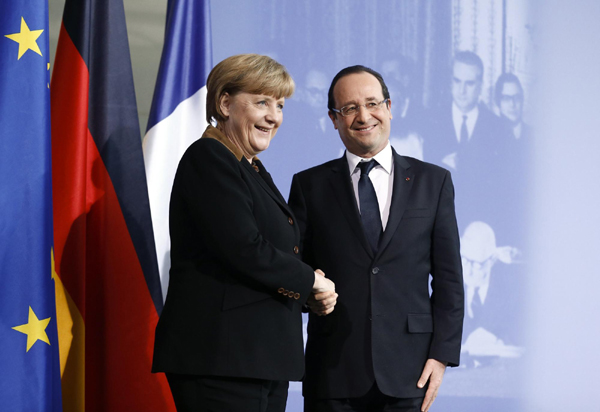 |
|
German Chancellor Angela Merkel (L) and French President Francois Hollande exchange a handshake in front of an image showing French President Charles de Gaulle and German Chancellor Konrad Adenauer signing the Elysee treaty at the Chancellery in Berlin during a day of celebrations marking the 50th Anniversary of the Elysee Treaty, Jan 22, 2013. [Photo/Agencies] |
The document was one that cemented European countries, six at first and now 28, into a single market.
With the United Kingdom officially set to leave the group soon, the leaders of the 27 members will gather in Rome on Saturday to mark the 60th anniversary of the signing of the treaty.
At this critical moment, the European Union is paying special attention to the celebration on Saturday.
And the EU has every reason to celebrate. Many observers say European integration is one of the most significant human undertakings since World War II.
The EU can feel proud of that.
Confucius says a person at 60, will know the truth in all he hears.
Right now, the EU is now at a crossroad and it has launched a massive bottom-up campaign to discuss the union's future. European Commission President Jean-Claude Juncker will be finalizing that roadmap in September in the annual state of the union address.
If European leaders are really willing to listen to advice at the age of 60 of the EU, the following has been offered:
First of all, the EU should consider carefully why there have been prolonged wars and violence in neighboring regions, such as West Asia and North Africa.
When China deals with foreign relations, peace in neighboring regions always tops the leadership's agenda. This experience can work as a reference when the EU maps out its foreign policy strategy. Otherwise, if wars and confrontations take place nearby, refugees and war-displaced people, in their millions, will continue to flood in.
It is obvious that some European countries have followed on the heels of the United States in their West Asia and North Africa policies. However, the US is far away, while Europe is next to the regions in question. Therefore, Europe has to accept the consequences of its policies.
In the interests of both Europe and other regions, the EU should not help make war, but make peace in West Asia and North Africa.
Second, the EU must know the boundaries for its integration and geopolitical equilibrium. The current 28 members, consisting of nearly 500 million people, have already formed the world's biggest economy and its eurozone, consisting of 19 countries and 300 million citizens, is equivalent to the US.
It must think deeply about how to deal with relations with Russia, Turkey and other players next to it, instead of expanding further.
And third, the EU must maintain the diversity and vigor of member countries, instead of assimilating them in a single European identity.
It is an illusion to build up a "European Union of the States" because many member states are unwilling to share their sovereignty.
So, it should know the boundaries of its domestic policy and to make the union stronger, it should focus on defense expansion and having one voice on foreign policy, in a proactive and constructive way.
Rome was not built in a day.
But the future of the EU rests in the hands of European leaders when they meet on Saturday in Rome, where the very first chapter of EU history was written.
The author is deputy chief of China Daily European Bureau.
fujing@chinadaily.com.cn